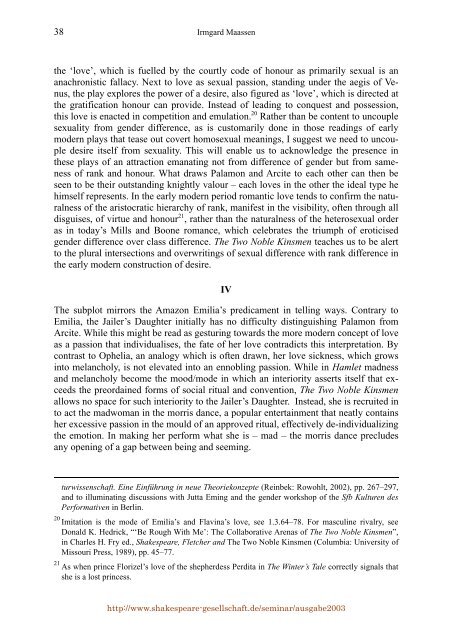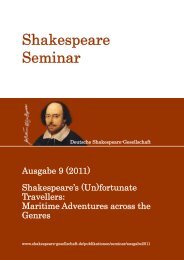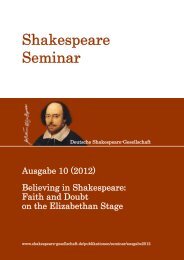Wissenschaftliches Seminar Online 1 (2003) - Shakespeare ...
Wissenschaftliches Seminar Online 1 (2003) - Shakespeare ...
Wissenschaftliches Seminar Online 1 (2003) - Shakespeare ...
You also want an ePaper? Increase the reach of your titles
YUMPU automatically turns print PDFs into web optimized ePapers that Google loves.
38<br />
Irmgard Maassen<br />
the ‘love’, which is fuelled by the courtly code of honour as primarily sexual is an<br />
anachronistic fallacy. Next to love as sexual passion, standing under the aegis of Venus,<br />
the play explores the power of a desire, also figured as ‘love’, which is directed at<br />
the gratification honour can provide. Instead of leading to conquest and possession,<br />
this love is enacted in competition and emulation. 20 Rather than be content to uncouple<br />
sexuality from gender difference, as is customarily done in those readings of early<br />
modern plays that tease out covert homosexual meanings, I suggest we need to uncouple<br />
desire itself from sexuality. This will enable us to acknowledge the presence in<br />
these plays of an attraction emanating not from difference of gender but from sameness<br />
of rank and honour. What draws Palamon and Arcite to each other can then be<br />
seen to be their outstanding knightly valour – each loves in the other the ideal type he<br />
himself represents. In the early modern period romantic love tends to confirm the naturalness<br />
of the aristocratic hierarchy of rank, manifest in the visibility, often through all<br />
disguises, of virtue and honour 21 , rather than the naturalness of the heterosexual order<br />
as in today’s Mills and Boone romance, which celebrates the triumph of eroticised<br />
gender difference over class difference. The Two Noble Kinsmen teaches us to be alert<br />
to the plural intersections and overwritings of sexual difference with rank difference in<br />
the early modern construction of desire.<br />
IV<br />
The subplot mirrors the Amazon Emilia’s predicament in telling ways. Contrary to<br />
Emilia, the Jailer’s Daughter initially has no difficulty distinguishing Palamon from<br />
Arcite. While this might be read as gesturing towards the more modern concept of love<br />
as a passion that individualises, the fate of her love contradicts this interpretation. By<br />
contrast to Ophelia, an analogy which is often drawn, her love sickness, which grows<br />
into melancholy, is not elevated into an ennobling passion. While in Hamlet madness<br />
and melancholy become the mood/mode in which an interiority asserts itself that exceeds<br />
the preordained forms of social ritual and convention, The Two Noble Kinsmen<br />
allows no space for such interiority to the Jailer’s Daughter. Instead, she is recruited in<br />
to act the madwoman in the morris dance, a popular entertainment that neatly contains<br />
her excessive passion in the mould of an approved ritual, effectively de-individualizing<br />
the emotion. In making her perform what she is – mad – the morris dance precludes<br />
any opening of a gap between being and seeming.<br />
turwissenschaft. Eine Einführung in neue Theoriekonzepte (Reinbek: Rowohlt, 2002), pp. 267–297,<br />
and to illuminating discussions with Jutta Eming and the gender workshop of the Sfb Kulturen des<br />
Performativen in Berlin.<br />
20<br />
Imitation is the mode of Emilia’s and Flavina’s love, see 1.3.64–78. For masculine rivalry, see<br />
Donald K. Hedrick, “‘Be Rough With Me’: The Collaborative Arenas of The Two Noble Kinsmen”,<br />
in Charles H. Fry ed., <strong>Shakespeare</strong>, Fletcher and The Two Noble Kinsmen (Columbia: University of<br />
Missouri Press, 1989), pp. 45–77.<br />
21<br />
As when prince Florizel’s love of the shepherdess Perdita in The Winter’s Tale correctly signals that<br />
she is a lost princess.<br />
http://www.shakespeare-gesellschaft.de/seminar/ausgabe<strong>2003</strong>





